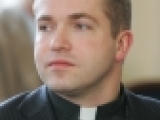 |
"Credit" relates to commitment that allows creditor to make some profit from the interest paid by debtor. Reckless and unconsidered credit brings headache to both parties, since one must keep one's commitments, while circumstances often come together so that if one party fails, the other does all they can to protect their interest. So there is little love in the entire affair. Only figures and commitments. Sometimes it all turns to the best for both, but at other times, it does not.
A testament is something entirely different. A testament's signatory declares her free will to let someone have all her possessions (and commitments) after her death. We sometimes hear people daydreaming about a rich uncle leaving them a fortune. There is a pertinent joke: “How did I become a successful businessman? I started with an apple. I bought it for 10 cents, I sold it for 20. Then I bought two apples for 20 cents and sold them for 40. And then my uncle died and left me a million.”
Easter irreconcilably divides humanity. It is a situation that can never be fit into the optimistic slogan of our times: Unity in diversity.
Once again, we are celebrating Easter – the resurrection of Christ. For Christians, it is a day of life and joy, because resurrection reminds us that we have inherited the world.
It is no accident that the resurrection is testified to in the Testament. As Paul the Apostle reminds us, a testament comes into effect after the death of its author. So after the Author of our Testament died, we came into our inheritance – the eternal life. It wouldn't be possible, if Lord himself hadn't resurrected. Resurrection and life are what is meant for Christians, since it is the way of Jesus and of every believer. It is much more than any fortune a worldly millionaire can leave for his heirs to fight over and squander. That inheritance is life.
Easter irreconcilably divides humanity. It is a situation that can never be fit into the optimistic slogan of our times: Unity in diversity.
The death of Christ and resurrection have divided the world into those who believe and those who don't. The ridge between them is deeper than one might think at first glance. It is not (only) a question of world views, philosophy, tradition. It is essential – some believe, accept and therefore possess the inheritance – life – and others don't. Some live by the Testament, others live on credit – in abeyance and tension over its end.
And if we, Christians, have anything to be happy about, it is the resurrection of Christ and the fact that we own resurrection and life. Let's rejoice with open hearts, because no one can dispute the Testament, unless we renounce it ourselves, by declaring – by our own existence – that we do not need life.
Let's rejoice at being free, since something that a man couldn't do was accomplished by God himself. And as there is nothing we can add to the sacrifice, there's nothing to be added to the resurrection. It simply is – and it is ours. Let's rejoice, because resurrection is not a symbol, imagination, or a parable – it is reality. Being one with Christ, we journey through passion, corporeal death, and resurrection. Let's rejoice, because no one will stop our resurrection in Him.
There's an episode in Oscar Wilde's “Salomé”:
Herod: He raises the dead?
First Nazarene: Yea, sire, He raiseth the dead.
Herod: I do not wish Him to do that. I forbid Him to do that. I allow no man to raise the dead. This Man must be found and told that I forbid Him to raise the dead. Where is this Man at present?
Second Nazarene: He is in every place, sire, but it is hard to find Him.
A witty dialogue about resurrection and the world's interdiction to proclaim it – it's the story of Christianity. Unlike the answer given to Herod, we have the news: He is resurrecting, he is everywhere and it is not hard for us to find Him, since He found us.
Happy Resurrection.











